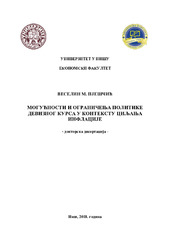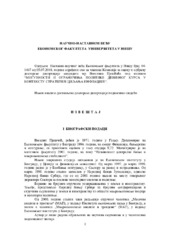| dc.contributor.advisor | Krstić, Borko | |
| dc.contributor.other | Marinković, Srđan | |
| dc.contributor.other | Furtula, Srđan | |
| dc.creator | Pješčić, Veselin M. | |
| dc.date.accessioned | 2019-03-25T11:11:47Z | |
| dc.date.available | 2019-03-25T11:11:47Z | |
| dc.date.available | 2020-07-03T15:59:24Z | |
| dc.date.issued | 2018-09-29 | |
| dc.identifier.uri | http://eteze.ni.ac.rs/application/showtheses?thesesId=6631 | |
| dc.identifier.uri | https://nardus.mpn.gov.rs/handle/123456789/10783 | |
| dc.identifier.uri | https://fedorani.ni.ac.rs/fedora/get/o:1546/bdef:Content/download | |
| dc.identifier.uri | http://vbs.rs/scripts/cobiss?command=DISPLAY&base=70052&RID=534033814 | |
| dc.description.abstract | The relatively short experience of the National Bank of Serbia in the implementation of the inflation targeting strategy, in addition to the partial success in achieving the set goals in terms of levels of the targeted inflation, was accompanied by a varying degree of the dinar exchange rate flexibility. The aim of the research is to provide a detailed analysis of the validity of certain exchange rate determination theories, as well as the role and importance of the exchange rate in the inflation targeting regime. Also, special attention was devoted to the analysis of the inflation targeting regime and the comparison of the inflation targeting regime with other monetary policy strategies, as well as the possibilities of direct and indirect targeting of the dinar exchange rate within inflation targeting.The conducted empirical analysis and verification of the validity of certain theories of exchange rate determination points to the basic determinants in the movement of the dinar exchange rate. The analysis of the effects of the dinar exchange rate on basic macroeconomic performance points to the importance of the exchange rate in the process of implementation of the monetary policy of the National Bank of Serbia. Comparative analysis with countries that have adopted the inflation targeting strategy indicates the similarities and differences in the practical implementation of the monetary and exchange rate policy. Due to the significance of the dinar exchange rate in the process of monetary policy implementation, as well as the specificity of the domestic economy, primarily in terms of the high level of financial system euroisation, and the significant effect of the change in the exchange rate on prices, the possibilities of indirect and direct targeting of the course within inflation targeting are analyzed. | en |
| dc.format | application/pdf | |
| dc.language | sr | |
| dc.publisher | Универзитет у Нишу, Економски факултет | sr |
| dc.rights | openAccess | en |
| dc.rights.uri | https://creativecommons.org/licenses/by-nc-nd/4.0/ | |
| dc.source | Универзитет у Нишу | sr |
| dc.subject | Monetarna politika | sr |
| dc.subject | Monetary policy | en |
| dc.subject | devizni kurs | sr |
| dc.subject | ciljanje inflacije | sr |
| dc.subject | exchange rate | en |
| dc.subject | inflation targeting | en |
| dc.title | Mogućnosti i ograničenja politike deviznog kursa u kontekstu ciljanja inflacije | sr |
| dc.type | doctoralThesis | en |
| dc.rights.license | BY-NC-ND | |
| dc.identifier.fulltext | https://nardus.mpn.gov.rs/bitstream/id/51580/Disertacija.pdf | |
| dc.identifier.fulltext | https://nardus.mpn.gov.rs/bitstream/id/51581/Pjescic_Veselin_M-converted.pdf | |
| dc.identifier.fulltext | http://nardus.mpn.gov.rs/bitstream/id/51580/Disertacija.pdf | |
| dc.identifier.fulltext | http://nardus.mpn.gov.rs/bitstream/id/51581/Pjescic_Veselin_M-converted.pdf | |
| dc.identifier.rcub | https://hdl.handle.net/21.15107/rcub_nardus_10783 | |



